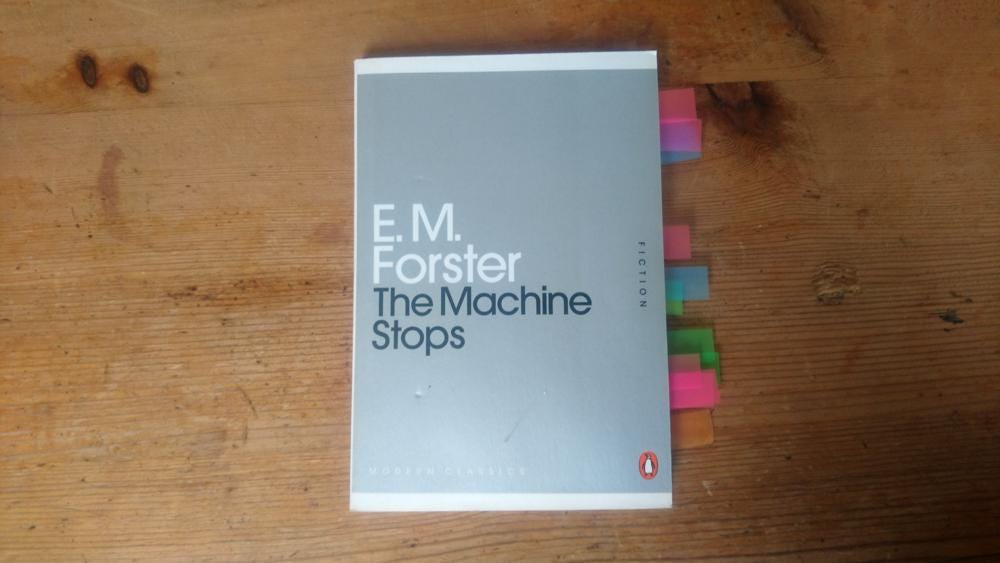Misperceptions
This week: the truth about immigration, the best way to get the right answer, and what happens when Google dies.
Happy Friday!
And a very warm welcome to you — particularly if you’re new around these parts. I hope you find something here that makes you go hmm. I’m always thrilled to hear from readers and thinkers like yourself. Just hit reply :)

Hello! Who on earth is this little grub? I’ll tell you the answer at the bottom of the email… :)
The Perils of Perception
Wandering the aisles of my local food shopping emporium the other day, I happened upon a misfortunate newspaper stand.
Before I could divert my hapless footwear in the direction of the sundried tomatoes and other preserves, I was revulsed by a series of headlines, all screaming something or other about immigration and Australia.
At first I thought that Boris Johnson might have re-requisitioned the earth’s largest island as a penal colony for The Crown. Then I remembered that it only feels like we’ve gone back to the eighteenth century.
The 2020 version of history could be recalled as bitterly, if we allow it.
The thing is, I can’t help feeling like the whole ‘pulling up the drawbridge’ immigration strategy is based on a gross misperception of who immigrants are and what they do when they get here.
To illustrate those misperceptions, we’re going to have a fun little quiz — YAY! — excised from The Perils of Perception by Bobby Duffy, the managing director of social research company Ipsos MORI.
Okay: ready?
What proportion of the UK population are immigrants?
If you said 25 percent, then congratulations! You have matched the average answer given by UK residents in a recent Ipsos MORI poll.
You’re also factually wrong by a remarkable 12 percentage points!
On average, we Brits think that a quarter of the UK population is an immigrant. That’s insane. The true answer is about half that figure: 13 percent.
In our heads, we’ve more or less doubled the number of foreign-born nationals in this country. Wow.
Okay, now our heads are a little tidier, here’s question two:
What proportion of immigrants to the UK are refugees and asylum seekers?
About a third? Bingo! That’s exactly what most people said, well done!
Yep: on average, people in the UK think that there are more refugees and asylum seekers than any other category of immigrant: more than those who came here for work, to study or to join their family.
Yep: we are wildly wrong.
Refugees and asylum seekers make up around 10 percent of the immigrant population — fewer in number than any of those other three categories. Cool.
Now onto the final question:
If you got question one wrong by 10 percentage points or more (and most people did), why do you think that was?
Think about this one carefully now — and be honest.
Almost half of everyone asked this question replied:
People come into the country illegally so aren’t counted.
Ah-ha — the figures aren’t accurate! That is true: there was something in the news about it.
But, sadly for The Daily Mail, all those lorry-loads of illegal immigrants couldn’t make up for our absurdly inaccurate guesses.
Even the most lurid estimates of illegal immigration, from a group campaigning for greater immigration control (Migration Watch UK), would add only 1.5 percentage points to the immigrants’ share of our population. Not 10 or more.
Never mind — press on — it doesn’t matter anyway because a gallant 45 percent of us, when challenged on our reasoning, added:
I still think the proportion is much higher.
Q.E.D.
Okay, we’re wrong about the tidal wave of immigration — but what is to be done?
In 1963, Dervla Murphy cycled from Dunkirk to Delhi. The book she wrote about her journey, Full Tilt, is full of stories of hospitality, from the Pathan tribesman who helped her fix a puncture, to the nameless Pakistani women who gave her unbidden deep tissue massages at the end of every day’s riding, and the Indian family who nursed her while she spent a few days enjoying good, old fashioned dysentery.
Towards the end of her journey, high in the Karakoram Mountains of Kashmir, she is beckoned over by an old man to help him dig an enormous thorn out of his foot.
After so many months owing her life to the generosity of strangers, Dervla pulls out her knife and spend a quarter of an hour in surgery.
She then reflects on the contrast between the baked-in hospitality of Afghanistan and Pakistan with how people behave back home in Europe:
Here [in Kashmir] one is merely another human being … and it’s taken for granted that one will help if necessary just as when one needs help it is unfailingly given without anyone stopping to consider inconvenience or cost.
When, I wonder, did we forget to be mere human beings?
It’s a numbers problem
When we talk about ‘immigrants’, ‘refugees’ or ‘asylum seekers’ our brains collapse and die. Statistically speaking, we can’t get our heads around the numbers.
By 2018, there were roughly 361,000 people living in the UK who had originally come here as asylum seekers. That’s a huge number.
But it’s only 0.6 percent of the total population of the UK — and nearly two-thirds of them had, by 2018, lived in this country for more than 15 years.
In other words, most successful asylum seekers have been in this country longer than our 11.5 million children under 15. How ‘foreign’ are these asylum seekers, really?
I could squirt these massive numbers into your eyeballs all day, but it wouldn’t make a jot of difference: they are all stratospherically incomprehensible. We simply can’t empathise when populations get that big.
Another question:
What’s the largest population size our puny brain can empathise with before it starts to struggle?
Congratulations to those of you who said one (1).
Yes: one whole human being. For populations in excess of one, we start to struggle.
This has been empirically tested by Paul Slovic, a psychology professor at the University of Oregon. In a series of experiments, Slovic and his team looked at how much money people were willing to donate to help starving children in Africa.
Slovic summarises the outcome:
Donations to aid a starving 7-year-old child in Africa declined sharply when her image was accompanied by a statistical summary of the millions of needy children like her in other African countries. The numbers appeared to interfere with people’s feelings of compassion toward the young victim.
One starving child = pity. Millions of starving children = brain-melt.
Slovic calls this effect ‘psychic numbing’: the sheer scale of tragedy drives us to apathy.
And, as Slovic discovered in a follow-up study, psychic numbing begins at the vast number of just two human beings:
Feelings of compassion and donations of aid were smaller for a pair of victims than for either individual alone.
One starving child = pity. Two starving children = not so much.
No wonder we’re pulling up the drawbridge: our brains, if not our borders, are being swamped in statistics.
Wait — optimism coming up!
Remember Alan Kurdi? Of course you do. That’s the point: one human being.
Kurdi’s death was the story of one human being, tragically drowned while escaping to Kos — emphatically not the multitude of stories about the 7,000 or more nameless refugees who have landed (alive, thankfully) on Kos in the past two years alone.
The widespread media reports of Alan Kurdi’s death in September 2015 broke the dam on our natural instincts for hospitality, generosity and compassion — so apparent to Dervla Murphy in Afghanistan and Pakistan.
In fact, Thighs of Steel cyclists raise money for one of the appeals set up in that compassionate summer of 2015. Help Refugees is still going strong, although donations are harder to come by in recent years — a symptom of growing apathy around support for refugees.
I argue that this apathy is not because we have forgotten how to be mere human beings, but because our puny brains have been swamped by hundreds, thousands, millions and, occasionally, bazillions of — not immigrants, asylum seekers and refugees — but numbers themselves.
We need to go back to one.
When faced with one ‘mere human being’ in crisis, we respond with compassion and generosity. We do, we all do — yes, even the Daily Mail readers among us.
Think of the hoary line of the racist: ‘I just think people should go back where they came from — oh, I don’t mean you, Mr Melaku, you’re alright!’
In our ones, we’re all alright. So let’s not think then of the millions, but think of the one. Think of Dervla Murphy’s ‘mere human being’.
The old proverb more or less agrees: look after the ones and the millions will look after themselves.
~
Thanks to M.G. and F.M. for the reading suggestions. If you know a great book I should read, chuck it onto the Books Make Books thread.
If you’d like to get your head round more misperceptions, I encourage you to browse the Ipsos MORI Perils of Perception data archive.
Think Bigger
Cunningham’s Law
The best way to get the right answer on the internet is not to ask a question; it’s to post the wrong answer.
Named for and inspired by Ward Cunningham, the programmer who developed the first wiki.
Alternatively, as the French say:
Prêcher le faux pour savoir le vrai.
Preach falsehood to know the truth.
I really hope this is what Boris Johnson is doing.
Books Make Books: The Machine Stops

Continuing my fascination with E.M. Forster, this wee book contains two short stories. The first, eponymous, tale imagines a world suddenly bereft of Google, Amazon, Apple, Facebook and Microsoft.
There came a day when, without the slightest warning, without any previous hint of feebleness, the entire communication-system broke down, all over the world, and the world, as they understood it, ended.
Forster captures the despair of a digital apocalypse with remarkable clarity: picturing a future where man is ‘strangled in the garments that he had woven’.
I say remarkable because Forster wrote The Machine Stops in 1928.
Read more about this extraordinary story on Books Make Books. Subscribe if you like: I’ll probably get through 40-50 books this year.
Your neck of the woods?
I’m up to London tomorrow to read through our new script. On Sunday it’s the Thighs of Steel monthly social ride. After that, I’m back to Bournemouth for another few days of writing (and table tennis).
Much love,
dc:
CREDITS
David Charles wrote this newsletter. He publishes another newsletter about reading called Books Make Books. David is co-writer of BBC Radio Wales sitcom Foiled, and writes for The Bike Project, Forests News, Global Landscape Forum, Elevate and Thighs of Steel. He also edits books about adventure, activism and more. Reply to this email, or delve into the archive on davidcharles.info. Thank you for reading!
These weekly newsletters are currently 0.8 percent funded. I hope to carry on giving all my writing away for free. You can help support by becoming a paying subscriber for £30/year. Needless to say: thank you!
Answer: It’s a glowworm larva! Pre-metamorphosis, so no one was sure whether it was male or female.

